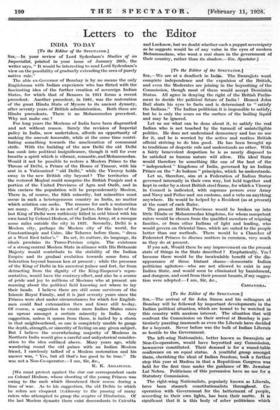Letters to the Editor
INDIA TO-DAY
[To the Editor of the SPECTATOR.]
Snt,—In your review of Lord Sydenham's Studies of an Imperialist, printed in your issue of January 28th, the writer says, " It would be interesting to read Lord Sydenham's view on the possibility of gradually extending the area of purely native rule."
The able ex-Governor of Bombay is by no means the only Englishman with Indian experience who has flirted with the fascinating idea of the further creation of sovereign Indian States, for which that of Benares in 1911 forms a recent precedent. Another precedent, in 1881, was the restoration of the great Hindu State of Mysore to its ancient dynasty, after seventy years of British administration. Both these are Hindu precedents. There is no Mohammedan precedent. Why not make one ?
For long years the Moslems of India have been disgruntled and not without reason.. Surely the revision of Imperial policy in India, now undertaken, affords an opportunity of making the amends honorable, while at the same time contri- buting something towards the amelioration of communal strife. With the building of the new Delhi the old Delhi has sunk into political insignificance, though it will for ever breathe a spirit which is vibrant, romantic, and Mohammedan. Would it not be possible to restore a Moslem Prince to the Throne of Delhi, a Prince of the House of Timour, with his seat in a Vaticanized " old Delhi," while the Viceroy holds sway in the new British city beyond ? The territories of the restored Moghul could comprise the British Punjab and a portion of the United Provinces of Agra and Oudh, and in this enclave the population will be preponderantly Moslem. There is, of course, the Sikh minority, but minorities must occur in such a heterogeneous country as India, no matter which solution one seeks. The reasons for such a restoration are many. Firstly, it is an act of justice, for the heirs of the last King of Delhi were ruthlessly killed in cold blood with his own hand by Colonel Hodson, of the Indian Army, at a mosque some miles outside the city in 1857. Secondly, Delhi is a Moslem city, perhaps the Moslem city of the world, for Constantinople and Cairo, like Teheran before them, " dress at a West End tailor's." Its art, its culture, its language, its ideals proclaim its Turco-Persian origin. The existence of a strong central Moslem State in alliance with His Britannic Majesty would contribute to the stability of the Indian Empire and its gradual evolution towards some form of federation beyond human ken at present ; while the presence of the King of Delhi in his ancestral palace and fort, far from detracting from the dignity of the King-Emperor's repre- sentative, would have the contrary effect, and also be a source of pride and joy to millions of Moslems who at present are roaming about the political field knowing not where to lay their heads. I believe there are still some survivors of the Islamic Royal Fa'rnily, and-it is just seventy years since the Princes were shot under circumstances for which few English- men could find extenuation then and fewer still to-day. Of course, a suggestion to create More Indian States raises an uproar amongst a certain minority in India. Any suggestion, unless it comes from them, is hailed by a storm in that neighbourhood, so one is completely unable to gauge the depth, strength, or sincerity of feeling on any given subject. But I believe the overwhelming majority of Moslems in Northern India would give a careful and unhysterical consider- ation to the idea outlined above. Many years ago, while wandering round the old palace with an Indian Moslem friend, I carelessly talked of a Moslem restoration and his answer was, " Yes, but all that's too good to be true." He was not a Non-Co-operator.—I am, Sir, &c.,
K. K. ARDASCHIR.
[We must protest against the slur our correspondent casts on Colonel Hodson, whose shooting of the young Princes was owing to the mob which threatened their rescue during a time of war. As to his suggestion, the old Delhis to which he refers are eloquent testimony to the passing of many rulers who attempted to grasp the sceptre of Hindustan. Of the last Moslem dynasty there exist descendants in Calcutta and Lucknow, but we doubt whether such a puppet sovereignty as he suggests would be of any value in the eyes of modern Mohammedans, who want a real share in the government of their country, rather than its shadow.—ED, Spectator.]






































 Previous page
Previous page